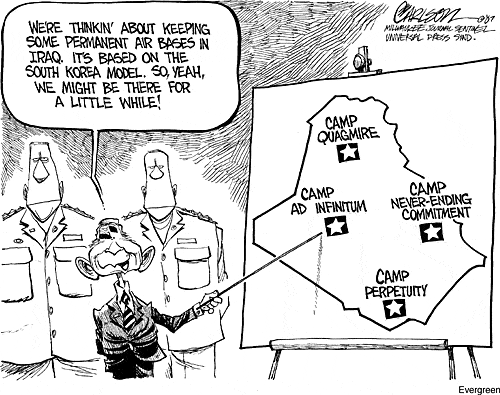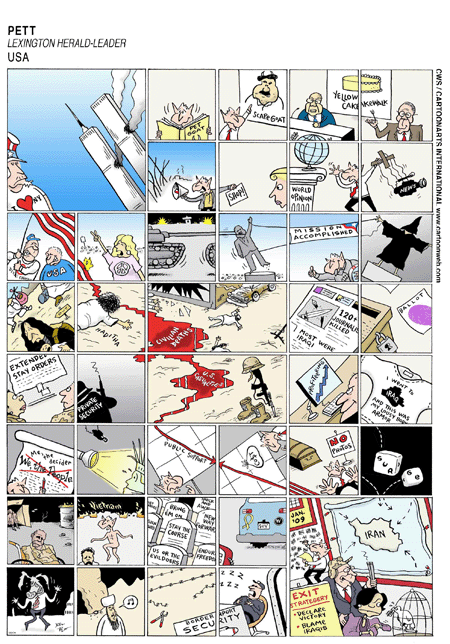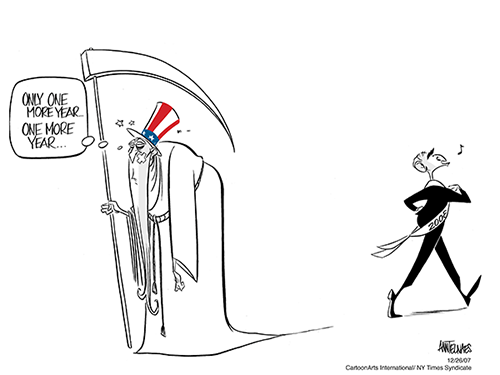There are too many moments these days when we cannot recognize our country. Sunday was one of them, as we read the account in The Times of how men in some of the most trusted posts in the nation plotted to cover up the torture of prisoners by Central Intelligence Agency interrogators by destroying videotapes of their sickening behavior. It was impossible to see the founding principles of the greatest democracy in the contempt these men and their bosses showed for the Constitution, the rule of law and human decency.
It was not the first time in recent years we've felt this horror, this sorrowful sense of estrangement, not nearly. This sort of lawless behavior has become standard practice since Sept. 11, 2001.
The country and much of the world was rightly and profoundly frightened by the single-minded hatred and ingenuity displayed by this new enemy. But there is no excuse for how President Bush and his advisers panicked — how they forgot that it is their responsibility to protect American lives and American ideals, that there really is no safety for Americans or their country when those ideals are sacrificed.
Out of panic and ideology, President Bush squandered America's position of moral and political leadership, swept aside international institutions and treaties, sullied America's global image, and trampled on the constitutional pillars that have supported our democracy through the most terrifying and challenging times. These policies have fed the world's anger and alienation and have not made any of us safer.
In the years since 9/11, we have seen American soldiers abuse, sexually humiliate, torment and murder prisoners in Afghanistan and Iraq. A few have been punished, but their leaders have never been called to account. We have seen mercenaries gun down Iraqi civilians with no fear of prosecution. We have seen the president, sworn to defend the Constitution, turn his powers on his own citizens, authorizing the intelligence agencies to spy on Americans, wiretapping phones and intercepting international e-mail messages without a warrant.
We have read accounts of how the government's top lawyers huddled in secret after the attacks in New York and Washington and plotted ways to circumvent the Geneva Conventions — and both American and international law — to hold anyone the president chose indefinitely without charges or judicial review.
Those same lawyers then twisted other laws beyond recognition to allow Mr. Bush to turn intelligence agents into torturers, to force doctors to abdicate their professional oaths and responsibilities to prepare prisoners for abuse, and then to monitor the torment to make sure it didn't go just a bit too far and actually kill them.
The White House used the fear of terrorism and the sense of national unity to ram laws through Congress that gave law-enforcement agencies far more power than they truly needed to respond to the threat — and at the same time fulfilled the imperial fantasies of Vice President Dick Cheney and others determined to use the tragedy of 9/11 to arrogate as much power as they could.
Hundreds of men, swept up on the battlefields of Afghanistan and Iraq, were thrown into a prison in Guantánamo Bay, Cuba, so that the White House could claim they were beyond the reach of American laws. Prisoners are held there with no hope of real justice, only the chance to face a kangaroo court where evidence and the names of their accusers are kept secret, and where they are not permitted to talk about the abuse they have suffered at the hands of American jailers.
In other foreign lands, the C.I.A. set up secret jails where "high-value detainees" were subjected to ever more barbaric acts, including simulated drowning. These crimes were videotaped, so that "experts" could watch them, and then the videotapes were destroyed, after consultation with the White House, in the hope that Americans would never know.
The C.I.A. contracted out its inhumanity to nations with no respect for life or law, sending prisoners — some of them innocents kidnapped on street corners and in airports — to be tortured into making false confessions, or until it was clear they had nothing to say and so were let go without any apology or hope of redress.
These are not the only shocking abuses of President Bush's two terms in office, made in the name of fighting terrorism. There is much more — so much that the next president will have a full agenda simply discovering all the wrongs that have been done and then righting them.
We can only hope that this time, unlike 2004, American voters will have the wisdom to grant the awesome powers of the presidency to someone who has the integrity, principle and decency to use them honorably. Then when we look in the mirror as a nation, we will see, once again, the reflection of the United States of America.



